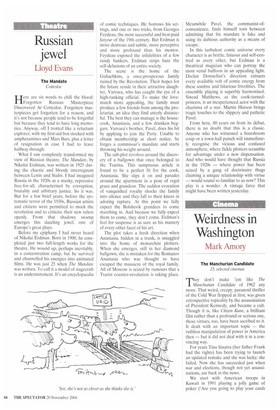Russian jewel
Lloyd Evans
The Mandate Cortesloe
Here are six words to chill the blood: Forgotten Russian Masterpiece Discovered At Cottesloe. Forgotten masterpieces get forgotten for a reason, and it's not because people tend to be forgetful but because they tend to have long memories. Anyway, off I trotted like a reluctant explorer, with my first-aid box stocked with amphetamines and Mars Bars, plus a letter of resignation in case I had to leave halfway through.
What I saw completely transformed my view of Russian theatre. The Mandate, by Nikolai Erdman, was written in 1925 during the chaotic and bloody interregnum between Lenin and Stalin. I had imagined Russia in the 1920s as a murky, repressive free-for-all, characterised by corruption, brutality and arbitrary justice. So it was. But for a few brief years, before the systematic terror of the 1930s, Russian artists and citizens were permitted to mock the revolution and to criticise their new rulers openly. From that shadowy swamp emerges this dazzling jewel, one of Europe's great plays.
Before my epiphany I had never heard of Nikolai Erdman. Born in 1900, he completed just two full-length works for the theatre. He wound up, perhaps inevitably, in a concentration camp, but he survived and channelled his energies into animated films. He was just 25 when The Mandate was written. To call it a model of stagecraft is an understatement. It's an encyclopaedia
of comic techniques. He borrows his settings, and one or two tricks, from Georges Feydeau, the most successful and best-paid farceur of the 19th century. But Erdman is more dextrous and subtle, more perceptive and more profound than his mentor. Feycleau exposed the infidelities of a few randy bankers. Erdman strips bare the self-delusions of an entire society.
The scene is the home of the Guliachkins, a once-prosperous family ruined by the Revolution. Their hopes for the future reside in their attractive daughter, Varvara, who has caught the eye of a high-ranking official. To make the lovematch more appealing, the family must produce a few friends from among the proletariat, an idea they find utterly distasteful. The best they can manage is the housecook, Anastasia, and a few drunken beggars. Varvara's brother, Pavel, does his hit by applying to join the Party. Unable to obtain membership at short notice, he forges a commissar's mandate and starts throwing his weight around.
The sub-plot revolves around the discovery of a ballgown that once belonged to the Tsarina. This sumptuous article is found to be a perfect fit for the cook, Anastasia. She slips it on and parades around the apartment in a pose of regal grace and grandeur. The sudden evocation of vanquished royalty shocks the family into silence and they fall to their knees in adoring rapture. At this point we fully expect the Bolshevik grandees to come marching in. And because we fully expect them to come, they don't come. Erdman's feel for suspense is as sure as his mastery of every other facet of his art.
The plot takes a fresh direction when Anastasia, hidden in a trunk, is smuggled into the home of monarchist plotters. When she emerges, still in her diamond ballgown, she is mistaken for the Romanov Anastasia who was thought to have escaped the massacre of the royal family. All of Moscow is seized by rumours that a Tsarist counter-revolution is taking place. Meanwhile Pavel, the communist-ofconvenience, finds himself torn between admitting that his mandate is fake and using its dubious authority as a means of escape.
In this turbulent comic universe every character is as brittle, fatuous and self-centred as every other, but Erdman is a theatrical magician who can portray the most venal buffoon in an appealing light. Declan Donnellan's direction extracts every available volt of comic energy from these sombre and hilarious frivolities. The ensemble playing is superbly harmonised. Sinead Matthews, as the cook-turnedprincess, is an inexperienced actor with the charisma of a star. Martin Hutson brings tragic touches to the slippery and pathetic Pavel.
From here, 80 years on from its debut, there is no doubt that this is a classic. Anyone who has witnessed a boardroom coup or a town-hall putsch will immediately recognise the vicious and confused atmosphere, where fickle plotters scramble for advantage under a new dispensation. And who would have thought that Russia in the 1920s — where power has been seized by a gang of doctrinaire thugs claiming a unique relationship with virtue — would sound so familiar to us now? This play is a wonder. A vintage farce that might have been written yesterday.


























































































 Previous page
Previous page